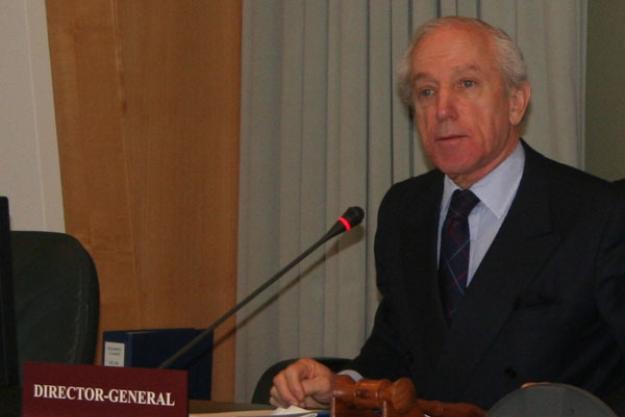
OPCW Director-General Ambassador Rogelio Pfirter
In respectful memory of all victims of chemical warfare, let us together continue forward our march towards a better and more humane future for our present and future generations.
Mr Chairman, Excellencies, Distinguished guests, We are gathered once again to remember the tragic victims of chemical weapons.
I express my gratitude to you, Ambassador Idris, for presiding over this solemn observance in your capacity as Chairman of the Conference of the States Parties and to all participants for their attendance.
It is heart warming to see that this gathering brings together distinguished Representatives and delegates of States Parties, high representatives of international organisations based in The Hague, Dutch institutions and government as well as the civil society.
I warmly welcome in our midst, Mr Ed Kronenburg, Secretary-General of the Ministry of Foreign Affairs of the Kingdom of the Netherlands. This is his maiden visit to the OPCW after assuming his important responsibilities and I am grateful to him for his presence despite his busy schedule.
I also express a hearty welcome to Mr G.P.H. Huffnagel, Vice Mayor of The Hague.
The presence of these distinguished personalities underlines the close cooperation the OPCW enjoys with both the Municipality of The Hague and the Dutch government.
The location of the OPCW in The Hague is a tribute to the unwavering quest to outlaw poisonous gases that began in this city over a century ago. Both in symbol and in substance, our mission derives strength from the continuing support of our hosts.
Last year on the occasion of the completion of 10 years of the operation of the Chemical Weapons Convention(CWC), Her Majesty Queen Beatrix graciously unveiled the memorial to all victims of chemical warfare.
From the fields of Ieper and other battlefields of the Great War, to Halabja, the Iran-Iraq conflict and the terrorist attack in the Tokyo subway, those dreadful arms were extensively used prior to the entry into force of the Chemical Weapons Convention. The suffering victims included innocent children, elderly and other civilians. Their anguish will continue to sustain our determination to fulfil the noble goals of the Chemical Weapons Convention.
The memory of those victims and the gruesome manner in which they perished, saddens us. The living memorial gives hope.
It is a constant reminder of the real meaning and significance of the commitment all of us have undertaken under the CWC to ensure that such atrocities never revisit any of our peoples.
It is a cause that transcends national boundaries and parochial interests. It is a mission that binds us closely together.
The thought that we are all called upon to play a part in protecting the life and dignity of the human person brings a sense of awe. It is a profound thought. But it also demands a great sense of responsibility.
Just over a week ago, the Second Review Conference of States Parties to the CWC reaffirmed the value of the multilateralism whose fruits we reap every day in the work of the OPCW.
The values and norms that the Convention embodies have thus been rejuvenated.
The success of the Conference in renewing every aspect of OPCW’s mission constitutes in itself an appropriate homage to the memory of countless victims across the world who suffered the cruelty of chemical weapons.
Indeed in the 11 years that we count, concrete progress has been achieved in eliminating large stockpiles of chemical weapons.
It is now almost a daily occurrence for chemical industry somewhere in the world to be inspected as part of the verification regime of the Convention.
The OPCW has developed assistance and protection procedures and international cooperation programs for the benefit of all its Member States.
The confidence that the international community places in the value of the Convention is manifest in the swelling ranks of our Membership that today stands at 183 nations encompassing 98% of the global population.
We are committed to banishing forever one of the most abhorrent means of warfare and destruction. And we translate our words into deeds by working together on the basis of equality and by demonstrating concrete progress in disarmament and non-proliferation through the work of the OPCW.
The ethos of cooperation and consensus we have built at the OPCW, engenders hope that we can deal effectively with the business that remains unfinished.
That includes acceptance of the Convention by the 12 remaining States; ensuring the elimination of all declared chemical weapons by 29 April 2012; effective domestic implementation of the Convention so as to render it effective against those who may chose to violate its prohibitions for criminal or terrorist purposes; and, ensuring that its relevance can be secured in a future where science and technology are rapidly advancing.
Thanks to the devotion of our States Parties, humankind’s long-standing aspiration to ban poison as a means of warfare is now an emphatic reality.
It constitutes a living example of how the UN Charter and its principles for the promotion of international peace and security can be transformed into action.
It is a credit to the resolve and hard work of our members that we can now rightly claim the Convention as setting new standards for global disarmament and non-proliferation.
Indeed our multilateral endeavours at the OPCW can inspire the international community to yet greater strides in the service of peace, progress and harmony.
In respectful memory of all victims of chemical warfare, let us together continue forward our march towards a better and more humane future for our present and future generations.
I thank you for your attention.
